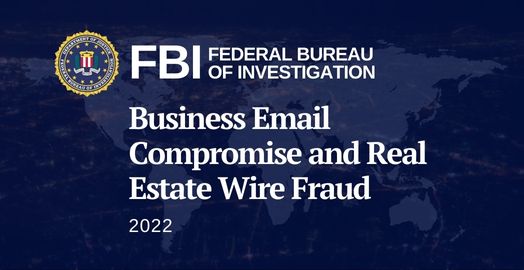In a November report to Congress on business email compromise (BEC) and real estate wire fraud (REWF), the FBI announced enhanced efforts to put the brakes on what has become one of the most financially damaging crimes in the United States.
According to the FBI report, BEC has been the largest dollar loss by victim crime typology reported to IC3 in the past several years, with over $2.4 billion of losses in 2021.
“For comparison, the second highest dollar loss category reported to IC3 was investment fraud, with losses of approximately $1.45 billion,” the FBI reported. “In other words, dollar losses associated with BEC were over 65% more than dollar losses associated with investment fraud.”
The FBI noted in its report that criminals have been refining their exploitation of technology, especially the internet, to carry out financial crimes, logging substantial increases in internet-enabled financial frauds such as bank account takeovers, synthetic identity related frauds, money laundering through virtual currency, and BEC.
“The FBI has pivoted its approach to address this issue through gathering intelligence, utilizing advanced investigative techniques in conjunction with traditional financial crimes investigative techniques, using proactive public and private partnerships, and education and awareness campaigns,” the agency noted in the report.
Real estate wire fraud in the crosshairs
REWF is a sub-category of BEC, in which criminal actors target individuals or companies executing large wires related to real estate transactions. As our agents are aware, the criminals pose as parties to the transaction and directly communicate with the other parties to steal funds intended to pay for the real estate.
According to IC3 complaint data, victims participating at all levels of a real estate transaction have reported such activity, including title companies, law firms, real estate agents, buyers, and sellers. The FBI has specifically focused on addressing REWF due to its prevalence in the U. S. and the effect it can have on the individual victims of the REWF schemes, who may be home buyers wiring their life savings.
These schemes and the preventative measures that title agents can take have been detailed in Alliant National’s 2022 Escrow Fraud/Social Engineering White Paper.
In its report to Congress, the FBI updated its preventative measures to include the following recommendations:
- Use secondary channels or two-factor authentication to verify requests for changes in account information.
- Ensure the URL in emails is associated with the business/individual it claims to be from.
- Be alert to hyperlinks that may contain misspellings of the actual domain name.
- Refrain from supplying login credentials or PII of any sort via email.
- Verify the email address used to send emails, especially when using a mobile or handheld device, by ensuring the sender’s address appears to match who it is coming from.
- Ensure the settings in employees’ computers are enabled to allow full email extensions to be viewed.

First published in 2017 and fully updated by Alliant National’s Compliance, Risk and Education teams, the paper provides information, tips and suggestions to help you better understand the current threat environment and create a comprehensive plan that addresses the realities we face in our industry.
Filling in the Gaps
The FBI has had considerable success in reclaiming lost funds through the IC3’s Recovery Asset Team (RAT) program, since its inception in 2018.
The RAT is designed to assist FBI field offices with the rapid recovery of funds for victims who made transfers to domestic accounts. In 2021, the RAT reported just over 1,700 incidents, with losses approaching $445 million. According to the FBI, the RAT was able to recover more than $328 million of the $445 million.
But there is more work to be done and the FBI has identified vulnerabilities which, if addressed, would bolster the ability of U.S. law enforcement to effectively address a wide range of threats, including BEC.
The first is getting access to beneficial ownership information to track funds that end up in accounts controlled by shell companies.
“The Corporate Transparency Act (CTA) provides for the creation of a national, non-public database of underlying beneficial ownership information for U.S.-registered businesses that meet specific criteria,” the FBI noted. “The data collected will be made available to U.S. law enforcement, subject to certain guardrails, offering a critical resource for identifying participants in a BEC scheme.”
On Sept. 29, the Financial Crimes Enforcement Network (FinCEN) issued the first of three rulemakings to implement the CTA, governing who must report and what information they must report to FinCEN. The final rule will take effect on January 1, 2024.
The effectiveness of this reporting requirement is as yet unknown, and there is some concern that the CTA exempts from its reporting requirements various types of entities, including trusts, which may affect efforts to identify the beneficial owners of trusts or other entities engaged in REWF.
The FBI is also recommending that UCC 4A-207 be redrafted to require banks to properly identify the name and number of the beneficiary and to determine they are in fact the same individual or entity. Currently, a bank may simply rely on the number as the identifier, without requiring a check to see if it is actually connected to the named beneficiary.
Cyber security #1 priority in 2023
As the threat from cyber criminals continues to escalate, it is imperative that our agents review their procedures for protecting client funds.
You can begin today to assess your systems and educate your staff to make sure every possible precaution has been put into place. We hope our Escrow Fraud/Social Engineering White Paper will be helpful in this work. Alliant National is committed to updating our agents to help you understand and respond to the current threat environment. Feel free to reach out to your agency representative, or any member of the Alliant National team if you have any concerns.



